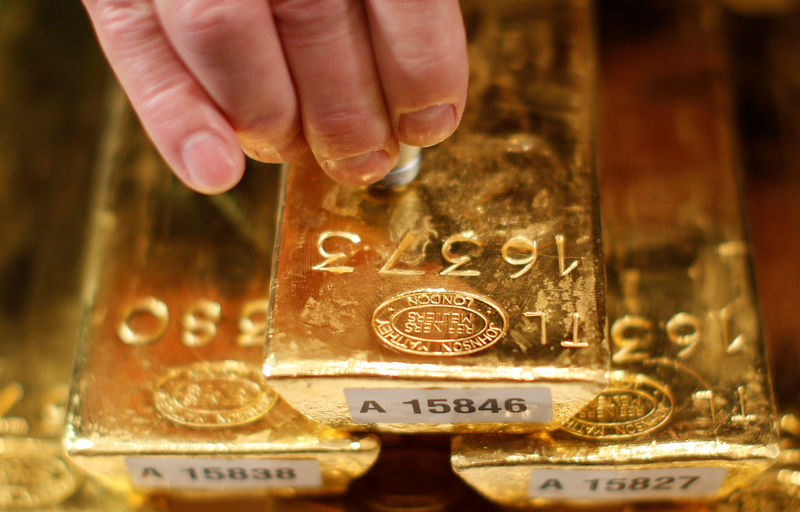Investing.com - Gold prices may continue to be underpinned by safe haven demand and a softer dollar in the coming week after rising on Friday amid renewed fears over trade tensions between the U.S. and China and after a weaker than expected U.S. jobs report.
Metals traders will be watching developments relating to trade policy as tensions between the world’s two largest economies continue to simmer.
Wednesday’s U.S. inflation data and the minutes of the Federal Reserve’s March meeting will also be in focus with traders looking for any fresh insights on the pace of U.S. monetary tightening.
China said Friday it was prepared to hit back “forcefully” if U.S. President Donald Trump followed through on a threat to impose $100 billion in additional tariffs on imports.
Worries that protectionist trade policies might result in a full blown trade war have boosted safe haven demand for gold amid fears over the impact on the global economy and U.S. growth.
Gold futures for June delivery settled at $1,337.70 on the Comex division of the New York Mercantile Exchange late Friday, to end the week up 0.66%.
Gold was also boosted after the Labor Department reported that the U.S. economy added the fewest jobs in six months in March as poor weather dampened hiring. However wage growth picked up slightly, indicating that the labor market is continuing to tighten.
The employment report left the outlook for monetary policy little changed. The U.S. central bank raised interest rates last month and forecast two more rate hikes this year.
The U.S. dollar index, which measures the greenback’s strength against a trade-weighted basket of six major currencies, was down 0.33% to 89.82 in late trade.
Gold is denominated in the U.S. currency and becomes cheaper for holders of other currencies when the dollar falls.
Indications that the Fed is likely to stick to its plan for gradual interest rates increases have supported gold, which struggles to compete with yield-bearing assets when interest rates rise.
Elsewhere in precious metals trading, silver was little changed at $16.36 a troy ounce late Friday.
Platinum settled at $920.60, up 0.58% for the day and paring the week’s losses to 2.0%.
Among base metals, copper for May delivery fell 1.19% to $3.038 in late trade for a weekly loss of 0.39%.
Concerns over trade tensions have pressured copper prices since the start of 2018 after they hit a nearly four-year high in December.
Ahead of the coming week, Investing.com has compiled a list of the main economic events likely to affect the markets.
Monday, April 9
The UK is to release industry data on house price inflation.
The Bank of Canada is to publish its business outlook survey.
Tuesday, April 10
Australia is to publish a report on business confidence.
Canada is to produce data on building permits.
The U.S. is to report on producer price inflation.
Wednesday, April 11
China is to publish data on consumer and producer price inflation.
The UK is to release figures on industrial and manufacturing output and trade.
European Central Bank President Mario Draghi is to speak at an event in Frankfurt.
The U.S. is to produce data on consumer inflation.
The Federal Reserve is to publish the minutes of its March meeting.
Thursday, April 12
Bank of Japan Governor Haruhiko Kuroda is to speak at an event in Tokyo.
The ECB is to publish the minutes of its March Meeting.
Canada is to report on new house price inflation.
The U.S. is to publish the weekly report on initial jobless claims.
Bank of England Governor Mark Carney is to speak at an event in Toronto.
Friday, April 13
China is to publish trade figures.
The U.S. is to round up the week with a report on consumer sentiment.
